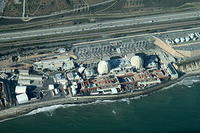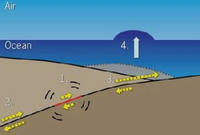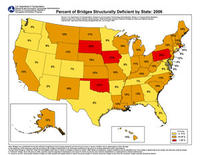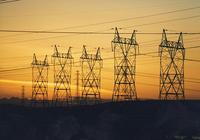-
Environmental group sues State Department for Keystone XL-related files
The Sierra Club has announced it is suing the State Department for files related to an environmental review draft of the Keystone XL pipeline. The group tried to gain access to the files through the Freedom of Information Act, but the request was denied, so the group filed the suit on Monday in the U.S. District Court in the Northern District of California.
-
-
Understanding next-generation nuclear fuel
The long search for the location of a rare element within nuclear fuel particles has ended. Researchers have finally pinpointed where silver congregates inside irradiated particles of a new type of nuclear fuel. The finding will help scientists better understand how select fission products such as silver can escape from tristructural isotropic (TRISO) fuel. This specialized fuel could run high-temperature gas-cooled reactors (HTGRs) that have numerous enhanced safety features.
-
-
House panel to unveil cybersecurity bill
Republicans on the House Homeland Security Committee are close to finalizing a long-awaited cybersecurity bill, following extensive discussions with private companies.The bill formally establishes DHS’s already-operating National Cybersecurity and Communications Integration Center, to circulate cyberthreat and vulnerability data.
-
-
Making jet fuel from switchgrass

The Energy Department’s National Renewable Energy Laboratory (NREL) is partnering with Cobalt Technologies, U.S. Navy, and Show Me Energy Cooperative to demonstrate that jet fuel can be made economically and in large quantities from a renewable biomass feedstock such as switch grass. The project could spur jobs in rural America, lead to less reliance of foreign oil.
-
-
California’s San Onofre nuclear power plant retired due to safety concerns

Southern California Edison (SCE) has decided it will retire the San Onofre nuclear power plant located on the California coast. The decision comes after officials debated for over a year whether the twin reactors could be safely restarted. The power plant is located in a populated area, with millions living near it.
-
-
Earthquake acoustics can indicate a massive tsunami is coming

Although various systems can detect undersea earthquakes, they cannot reliably tell which will form a tsunami, or predict the size of the wave. There are ocean-based devices that can sense an oncoming tsunami, but they typically provide only a few minutes of advance warning. Scientists have now identified key acoustic characteristics of the 2011 Japan earthquake that indicated it would cause a large tsunami. The technique could be applied worldwide to create an early warning system for massive tsunamis.
-
-
Thousands of U.S. bridges in “fracture critical” condition

There are currently 66,749 structurally deficient bridges and 84,748 functionally obsolete bridges in the United States – about a quarter of the nation’s 607,000 bridges. With declining federal funds for bridge repair, the burden of maintenance has shifted to states, which spent $28.5 billion last year on bridge work – up from $12.3 billion in 1998.
-
-
Protecting and climate proofing Europe’s coast
The coastline of EU member states extends over 17,000 kilometers. It is home to seventy million inhabitants. The estimated value of the assets within 500 meters from the coast rises to a staggering 1,000 billion Euros. An EU-funded science and engineering initiative is gathering all relevant scientific knowledge to develop a systematic approach to deliver a safe, natural, and climate-proof European coast.
-
-
Smarter energy use by industry could cut U.K. electricity demand by 75 percent
As the U.K. government debates the U.K. Energy Bill, new research has found that turning down non-essential services, such as heating, air-conditioning, and pumping equipment, at times of peak electricity demand could play a far greater role in helping the United Kingdom achieve future energy security.
-
-
U.S. hurricane supercomputers need an upgrade
During the hurricane season, which began last week, the U.S. National Weather Service (NWS) will use models from several supercomputers from around the world to generate predictions about hurricanes’ landfall, path, and intensity. Meteorologists say that the two American supercomputers used for storm modeling are underpowered and inferior to European computers.
-
-
Fukushima-derived radioactivity in seafood poses minimal health risks
Researchers find that the likely doses of radioactivity ingested by humans consuming fish contaminated by radioactive radiation escaping from the debilitated Fukushima reactors fish, are comparable to, or less than, the radiological dosages associated with other commonly consumed foods, many medical treatments, air travel, and other background sources.
-
-
U.S. unlikely to meet its biofuel goals

The Energy Independence and Security Act of 2007 (EISA) mandates that by 2022 the United States derive fifteen billion gallons per year of ethanol from corn to blend with conventional motor fuels. A new study says that if the climate continues to evolve as predicted by the Intergovernmental Panel on Climate Change, the United States stands little to no chance of satisfying its biofuel goals.
-
-
Government-developed standards not an effective cybersecurity approach: analyst
DHS said the department has “recently learned of a vulnerability that existed in the software used by a DHS vendor to process personnel security investigations.” analyst says that it is bad enough that hackers gained access to the personal information of thousands, but what is even more worrisome is the fact that DHS, with it spotty cyber security record, has been placed in charge of regulating the cybersecurity efforts of critical infrastructure industries.
-
-
Los Alamos director: cyber-securing U.S. electrical grid key to energy security

Los Alamos National Lab (LANL) director Charlie McMillan told a gathering of energy executives that securing the U.S. electrical grid is a major concern now, and it is only becoming more serious.
-
-
Hagel says Chinese cyberattacks a “growing threat”
Defense Secretary Chuck Hagel warned of a “growing threat” of cyberattacks against the United States, saying that America and its allies need to “establish international norms of responsible behavior in cyberspace.” Hagel spoke to an audience of defense analysts and defense ministers from Asia and Europe at the annual conference of the International Institute for Strategic Studies on Saturday.
-
More headlines
The long view
Helping Strengthen America’s Critical Infrastructure
Everyday life depends on a robust infrastructure network that provides access to running water, communications technology and electricity, among other basic necessities. The experts who keep our national infrastructure secure and resilient also need a strong network to share their knowledge and train the next generation of professionals capable of solving complex infrastructure challenges.
AI and the Future of the U.S. Electric Grid
Despite its age, the U.S. electric grid remains one of the great workhorses of modern life. Whether it can maintain that performance over the next few years may determine how well the U.S. competes in an AI-driven world.
Using Liquid Air for Grid-Scale Energy Storage
New research finds liquid air energy storage could be the lowest-cost option for ensuring a continuous power supply on a future grid dominated by carbon-free but intermittent sources of electricity.
Enhanced Geothermal Systems: A Promising Source of Round-the-Clock Energy
With its capacity to provide 24/7 power, many are warming up to the prospect of geothermal energy. Scientists are currently working to advance human-made reservoirs in Earth’s deep subsurface to stimulate the activity that exists within natural geothermal systems.
Experts Discuss Geothermal Potential
Geothermal energy harnesses the heat from within Earth—the term comes from the Greek words geo (earth) and therme (heat). It is an energy source that has the potential to power all our energy needs for billions of years.
